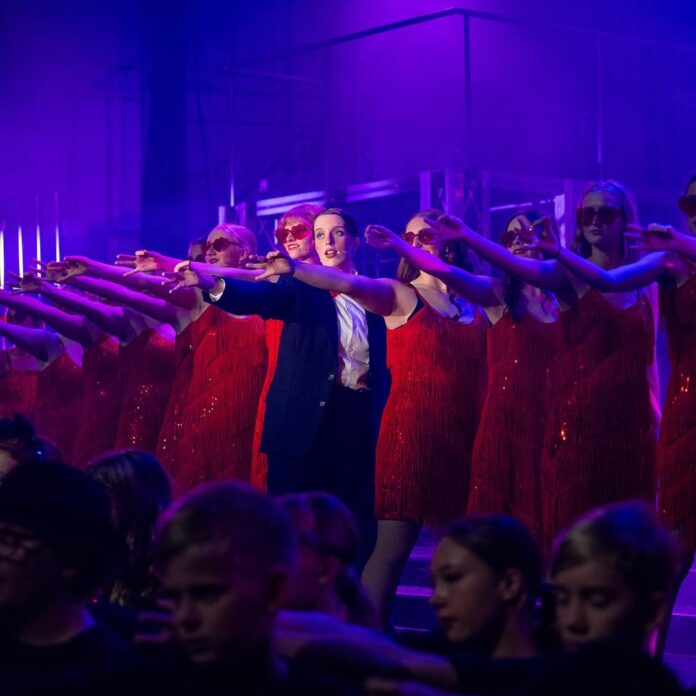This production had dual casts in the principal roles, the Velma cast and the Roxie cast. In the interests of fairness to all performers, we reviewed both casts.
Concordia College is rightly proud of its Performing Arts programme, and this production of Chicago clearly shows why that is so. Director Aldo Longobardi, MD Barnabas Smith (assisted by Billy St John) and Choreographer Maddie Lochert achieved wonders with the enormous cast and the demands of this musical.
At first blush it may seem that Chicago is not a natural choice for a youth production. Consider the very large number of ‘crooked’ characters in it. The two main characters are unrepentant murderers and their greatest aid to getting off the charges is Billy Flynn, a shady lawyer, replete with ‘razzle dazzle’. However, this production clearly demonstrated the wisdom of the choice. As the Director points out in the programme, there are many thought-provoking and serous issues to be investigated while putting on this kind of theatre. That is a sound underpinning of the joy and satisfaction of performing something well.
And they did perform it well.
The whole show looked wonderful. The set was on two main levels and the cast was well deployed on and around it, deftly using the three staircases to the upper platform at the rear. With so many on stage – in the big ensemble numbers there were over eighty singing and moving in time – there were simple props and sets brought on and off, so as not to add clutter.
The choreography was, it must be said, a work of art. Take a bow, Maddie Lochert! There was at all times a focus and a real sense of the ensemble making meaning of every song. Wisely, on occasions, the crisp movements were predominantly effected by precise upper body, facial and arm gestures by the whole cast. It worked very well, showing precision and thorough rehearsal. At other times the specialist and junior dancers look the lead in providing suitable, often exciting, movement to illustrate the music’s purpose.
The very large auditorium was filled with the sound of the well-modulated band and the strong voices of the cast. The only minor difficulty was at those times when, for effect, some singers dropped the volume during reflective moments in solo pieces. Otherwise the balance was well maintained, and, musically, the whole performance was well disciplined and dramatically effective. A real highlight was the show-stopper We Both Reached For The Gun which was fast-paced and accurate. The cast, principals and ensemble alike, handled the tricky rhythms and syncopation with ease.
Roxie Cast
I was fortunate to see both principal casts, the first being the Roxie cast on opening night.
Amali Noble played Velma with strength and decided sassiness. She worked very well with Madeleine McNicol, as her rival, Roxie Hart. They complemented each other’s performances with confidence and conviction, Madeleine doing especially well in Funny Honey, while Amali shone in When Velma Takes The Stand. Tom Reuter was the consummate con-man and flamboyant show man as defence lawyer Billy Flynn. He sang with the mellow crooner’s tone of the era and showed precise dramatic timing in the spoken scenes.
Jack Shrowder drew the audience’s sympathy as Roxie’s husband, Amos. He was particularly effective in showing Amos’ vulnerability, and had the audience’s sympathy from the outset. Macy Francis was an imperious Matron, firmly establishing her character and attitudes in her first song and entrance through the audience.
They were well supported by the other featured leads, notably Victoria Thomas as Mary Sunshine and Cael Edwards as Fred Casely.
Velma Cast
Bianca Reid and Tilly Redford-Insall led from the front as Velma and Roxie. They had spark and flair and thorough command of the stage. Bianca’s strong singing, stage presence and timing were clear strengths. Tilly was articulate and full of sassy character. She used her mature voice to great effect in all her songs, and in dialogue displayed a subtlety in developing Roxie’s character, – as far as that is possible in this musical. Together they got the most out of their two later songs I Can’t Do It Alone and the reflective My Own Best Friend.
Matilda Preston was a remarkable Billy Flynn. She sang the songs with a wonderful tone, evocative of the 1920s. She brought the required swagger and sense of self-importance to the role and really brought it to life in Razzle Dazzle, which thus became one of the biggest and best songs of the night. As the down-trodden Amos, Ethan Fraser was compelling. He evoked our sympathy from the start and drew plenty of sympathetic sighs on his poignant final exit.
In all, this production was smooth, slick and well coordinated. It was thoroughly entertaining and of a uniformly high standard, a credit to all concerned.



